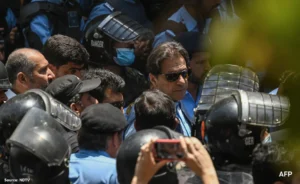Congratulations India: Celebrating the 25th Anniversary of Pokhran Nuclear Test
India is a proud nuclear power today, thanks to the historic Pokhran nuclear test that took place on May 11 and 13, 1998. The test, code-named Operation Shakti, was a series of five nuclear explosions that demonstrated India’s capability to build fission and fusion weapons with yields of up to 200 kilotons. The test also marked India’s emergence as a responsible and self-reliant nuclear state that seeks peace and security for itself and the world.
Congratulations India pic.twitter.com/MtMYmE1Zyc
— Nipuna Speaks (@ItsVijayIyengar) May 11, 2023
What was the Pokhran Nuclear Test?
The Pokhran nuclear test was the second instance of nuclear testing conducted by India; the first test, code-named Smiling Buddha, was conducted in May 1974. The Pokhran-II test consisted of one fusion bomb and four fission bombs that were detonated at the Indian Army’s Pokhran Test Range in Rajasthan. The test was carried out under the supervision of several key Indian scientists and military officials, including Dr. A.P.J. Abdul Kalam, Dr. R. Chidambaram, Dr. Anil Kakodkar, Dr. K. Santhanam, General V.P. Malik and General R.K. Singh.
The test was a culmination of decades of research and development in nuclear science and technology by India’s Atomic Energy Commission, Bhabha Atomic Research Centre, Defence Research and Development Organisation and other institutions. The test also involved a high degree of secrecy and deception to evade detection by foreign intelligence agencies and satellites.
Why did India conduct the Pokhran Nuclear Test?
India conducted the Pokhran Nuclear Test for several reasons, such as:
- To establish its credible minimum deterrence against potential adversaries, especially China and Pakistan, who had already acquired nuclear weapons.
- To assert its sovereignty and independence in the face of global nuclear non-proliferation regimes that discriminated against India and denied it access to peaceful nuclear technology.
- To enhance its scientific and technological capabilities and prestige in the fields of nuclear energy, space exploration, defence and security.
- To fulfil the national aspirations and aspirations of its people for a strong and prosperous India.
What were the consequences of the Pokhran Nuclear Test?
The Pokhran Nuclear Test had both positive and negative consequences for India, such as:
- It boosted India’s national pride and confidence and earned it respect and recognition from many countries as a major power in Asia and the world.
- It enabled India to develop a robust nuclear doctrine and command and control system that ensured its no-first-use policy and credible retaliation in case of a nuclear attack.
- It paved the way for India to engage in dialogue and cooperation with other nuclear powers, especially the United States, on issues of mutual interest and concern, such as terrorism, climate change, trade and energy security.
- It also triggered a series of sanctions and criticism from some countries, especially Japan and the United States, who accused India of violating international norms and destabilizing regional security.
- It also provoked Pakistan to conduct its nuclear tests in response, leading to increased tensions and risks of a nuclear conflict in South Asia.
- It also raised questions about India’s environmental and social responsibility, as the test caused radioactive contamination and displacement of local people in the vicinity of the test site.
How is India celebrating the 25th anniversary of the Pokhran Nuclear Test?
India is celebrating the 25th anniversary of the Pokhran Nuclear Test with various events and activities across the country, such as:
- The Prime Minister Narendra Modi will address the nation on May 11 at 9:00 am from Red Fort in Delhi and pay tribute to the scientists and soldiers who made the test possible.
- Defence Minister Rajnath Singh will visit the Pokhran Test Range on May 11 and unveil a statue of former Prime Minister Atal Bihari Vajpayee, who gave the final approval for the test.
- The Ministry of External Affairs will organize a webinar on May 11 on “India’s Nuclear Journey: 25 Years of Pokhran” with eminent speakers from India and abroad.
- The Ministry of Culture will organize a cultural festival on May 13 at India Gate in Delhi with performances by renowned artists from different states.
- The Ministry of Education will launch a quiz competition on May 13 for school students on “Pokhran: Pride of India” with attractive prizes.
- The Ministry of Information and Broadcasting will telecast documentaries and films on Pokhran on various channels and platforms.




Average Rating